12.27.2012 | 1:29 pm
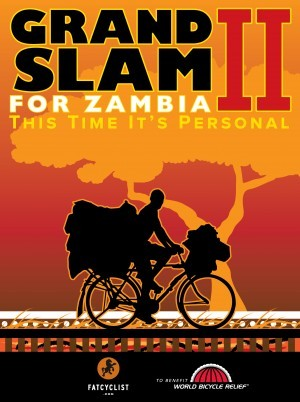 A month and a half ago, I set an ambitious goal: raise $125,000 for World Bicycle Relief (WBR) by December 24. That money, thanks to a dollar-for-dollar matching commitment secured by WBR, would then be doubled to a quarter-million dollars.
A month and a half ago, I set an ambitious goal: raise $125,000 for World Bicycle Relief (WBR) by December 24. That money, thanks to a dollar-for-dollar matching commitment secured by WBR, would then be doubled to a quarter-million dollars.
I then set about telling the story of my trip to Zambia with WBR last summer. And I started rolling out the prizes.
It became the focus of my blog, to the extent that some people correctly complained that I never talked about anything else anymore.
What I didn’t reply was that I kind of agreed with them, and that it would be a lot easier for me to write fake news and semi-real observations and about bike rides.
Because — believe it or not — writing fundraiser contest posts are absolutely positively the most difficult and taxing kind of posts there are for me to write.
But they’re worth doing.
And they’re especially worth doing when the results are stunning. As in, as of this moment we’ve raised about $168,500. Which, when matched, will come out to $337,000. And by the time some more corporate matching gifts get factored in, the total matched amount Grand Slam for Zambia 2 will have raised should be at — or very close to — $350,000. That’s $100,000 more than our goal.
Yeah.
In a recent post, I thanked the folks who donated prizes, as well as everyone who made donations. Now, I want to especially want to thank Patrick Dempsey, who did both. Not only did he — along with Tom Danielson — donate a slot in their ultra-deluxe winter training camp, but he also donated $5000 of his own money.
Pretty remarkable, especially considering that all I’ve ever done for him is give him a donut.
What Does This Mean?
$350,000 sounds like a lot of money. Because it is. What’s amazing, though, is what that money will buy:
- 2500 bikes ($134 * 2500 = $335,000)
- 50 mechanics (1 mechanic for every 50 bikes) trained ($250 * 50 = $12,500)
- 50 (1 for each mechanic trained) toolkits ($50 * 50 = $2500)
Bear in mind, too, that each bike benefits more than one person. So what does this mean? It means that your generosity has made a difference for thousands and thousands of people.
I feel pretty good about that.
What’s Next for Grand Slam for Zambia?
My job is done in this project, more or less. Now it’s up to Katie over at WBR to generate the random numbers and start sending out email. Within the next few days, some of you will be hearing from her, asking you to select which of the prizes you want to select.
There are so many amazing prizes here that I honestly do not know which of them I would select out of this batch. I do not envy those of you who will have to make this choice.
No, that’s a total lie. I do envy you. A lot.
What’s Next for FatCyclist.com?
So with this project out of the way, what am I doing next? That’s a fine question, and I’m glad I asked it of myself. Here’s my reply to me, in the form of a bullet list.
- I’m taking a vacation. I’ll be back at this blog starting January 7.
- I’m thinking about what I want to do next in terms of fundraising. I plan to continue to fundraise for the two causes I’ve chosen: fighting cancer and fighting poverty. How much, how often, when, how, and for whom are questions I’m currently considering.
- I’m thinking about what kind of blog writing I want to do. When I started this blog, I was in my very-late-30’s. Now I’m in my mid-late-40’s. This almost-eight-year period has seen a lot of change for me. An unbelievable amount of change, really. It’s ridiculous for me to think in terms of writing the same kinds of things I wrote the first few years of this blog; I’m no longer that guy. But I do still want to write, and I still want to write about biking. Do I have any idea of the direction or extent of changes this blog will take next year? No. But I do know that I’m not going to try to make this blog be the same thing it was in 2006. Or even 2010.
- I’m thinking about how long I want to write this blog. I’m closing in on eight years that I’ve been doing this. For the last year or two, I’ve been thinking that ten years is the maximum shelf life for any blog. But now I don’t know. Maybe ten years is too much. Or too little.
- I’m thinking about other projects I want to do. I want to publish Susan’s unfinished novel. I want to write the Caregiver’s Companion. I want to write Fight Like Susan. I want to compile and edit Volume 2 in The Best of FatCyclist.com. I know for sure I can’t do all of those this year, but I think I can do at least two of them. Which two is the question.
If you’ve got an opinion on any of these things, I’d love to hear from you.
Until 7 January 2013, thanks for reading, commenting, and — as often as I’ve asked — donating. Have a great holiday, and make some time to get on your bike — even if it has to be indoors — and ride.
Comments (80)
12.21.2012 | 8:18 am

UPDATE: Super-duper extra thanks go to Specialized, which — in addition to donating two of the grand prizes for this fundraiser (an S-Works Roubaix SL4 and a S-Works Stumpjumper FSR Carbon 29) — just donated $13,000.00 to the fundraiser as a “congrats on hitting your goal” gift.
This catapulted us right into the $140,000+ range, and makes me wonder: what if we raised $150,000 by the end of this fundraiser, which — after matching — would bring us to $300,000? That would be unbelievable in the very best way.
To everyone at Specialized who worked on promoting and donating to this project: thank you for your generosity and passion to make this ambitious fundraising project succeed. I was already a fan of your bikes; now I’m a fan of your company.
This is it: the last day before the end of the contest that I’ll be posting about Grand Slam 2 for Zambia (although you can continue to donate right up through midnight on Christmas eve to be eligible for any of the prizes in the contest).
For this post, I really just want to say thank you.
And I’m not the only one who wants to thank you, either.
The Hammer, my 1617-year-old son, and I made a slide show of our trip to Zambia last night as a reminder of what we’ve seen and the good you have done (and continue to do!) by helping us with this Bicycle Relief project.
I recommend watching it all the way through (by the way, it looks best if you watch it nice and big over on Vimeo) — the last minute is a video of a really fantastic speech made by one of the students at the Nanswisa Basic School, expressing gratitude for these bikes.
Note that the beautiful singing in the soundtrack for this video also came from the children at the Nanswisa Basic School during the bike distribution ceremony.
A Thank You Poem
For those of you who were wondering whether there would ever be another “Free Verse Friday,” well, today there is. But this isn’t the normal self-consciously horribly bad poem in the style I write.
No.
This is a poem that was written by the children of Nanswisa Basic School and performed by them during the bike distribution ceremony, and is titled “Bicycle Relief, We Thank You.”
Never believe that a few caring people
Cannot change the world
For indeed
They are the only who ever have
We thank you
The real measure of our wealth
Is how much we would be worth
If we get educated
Through this educational offer
Bicycle Relief
Bicycle Relief
We thank you
We are never given a wish
Without also being given the power
To make it come true
We indeed wished for better education
And we have been empowered
Through the education materials
These white horses
Bicycle Relief
We thank you
Gratitude unlocks the fulness of life
It turns what we have
Into enough and more
Oh we thank you!
Help is like snow
The softer it falls
The longer it dwells
And the deeper it sinks into our mind!
We will now write
Our long sufferings of long distance
And less educational materials
On the sand
And write you good will
Of making our education simple
On a piece of marble
Bicycle Relief
Bicycle Relief
We thank you
Less Eloquent Thanks
I want to thank you, as well. First, thanks for donating. We have reached and surpassed We’re down to the last $1000 before we hit our $125,000 goal, which means — thanks to a generous matching promise — our money will double to $250,000. A quarter million dollars.
UPDATE: Even though we’ve crossed the goal, additional donations continue to get matched, dollar-for-dollar, through the end of the contest! Also, donations continue to count toward the contest right through December 24.
The generosity of you people is astonishing. And shows of generosity like this — more than a thousand people coming together to improve thousands of strangers’ lives in permanent, powerful ways — are especially wonderful to see in times like these, where the news is often too ugly to contemplate.
So thank you.
I also want to thank the incredible people and companies who have made this the most extraordinarily prize-ladened fundraising contest I could ever imagine. Specialized. Levi Leipheimer and Levi’s Gran Fondo. Patrick Dempsey and Tom Danielson. Rebecca Rusch. Twin Six. Miir. Chris Horner. Honey Stinger. Ted King. Greg Herbold and Western Spirit Cycling Adventures.
Your generosity has gone so far beyond what I would expect of anyone. So, although it’s beginning to sound like I’m a broken record, I’m going to say it again:
Thank you. Thank you so much.
Comments (33)
12.20.2012 | 11:19 am
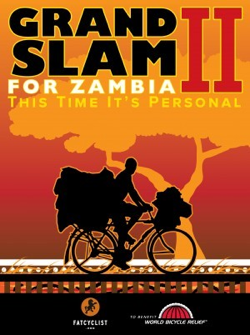 A Note from Fatty: We’re very nearly at the end. No, not of the world, silly. We’re nearly at the end of the Grand Slam for Zambia 2: This Time It’s Personal fundraiser. And we’re still a little — around $8,000 $7,000 $4,000 $3,000 $2,000 — shy of the $125,000 goal for this project.
A Note from Fatty: We’re very nearly at the end. No, not of the world, silly. We’re nearly at the end of the Grand Slam for Zambia 2: This Time It’s Personal fundraiser. And we’re still a little — around $8,000 $7,000 $4,000 $3,000 $2,000 — shy of the $125,000 goal for this project.
However, there’s still time for you to donate. In fact, if you’ve got a friend or family member you haven’t gotten a gift for, maybe consider making a donation on their behalf. Just go to the donation page, make a donation like you normally would, and after completing the donation, you’ll be given the option to make a card or e-card to give to someone, letting them know you’ve made the donation on their behalf.
World Bicycle Relief improves the lives of people in Africa in three big ways. The biggest way — the way I’ve focused on in my fundraisers — is bikes for schoolchildren. The second way is by providing bikes to community caregivers.
Today, I’m going to talk about the third way: the way that shows most obviously the huge economic impact a bike can have: Bicycles for small businesses.
The Big Idea
Here in the U.S., it’s easy to forget the critical part transportation plays in practically every business, but think about it: in order to sell any product or service, you must be able to get that product or service to your customer.
And if you’re limited to transportation on foot, your business is drastically limited in some very important ways: how much you can carry, how far you can carry it, and how quickly you can carry it.
These are big obstacles for any kind of business, but become even bigger problems if you live somewhere (like rural Zambia) where your product is likely to be bulky (like food), and can spoil if not delivered in a timely manner (like meat or milk).
World Bicycle Relief has stepped in with its microfinance project, selling (and financing the cost for 6 – 18 months) bikes to small businesses (often sole proprietors), to help them drastically extend their reach, their speed, and their capacity.
But why sell the bike to the small business? Why not just give it to them? Well, it goes back to the “giving like grownups” philosophy that World Bicycle Relief uses throughout the charity. If you give someone something — no strings attached — they are likely to squander it. There’s no cost for failure, no responsibility comes with a gift.
If, however, someone has to create a business case and is responsible for making that bike earn its keep, they are much more likely to take it seriously, and make it succeed.
World Bicycle Relief doesn’t want to be seen as a Santa Claus figure, magically appearing and giving out free gifts. If people are going into business, they need to buy their supplies; otherwise they’ll always be expecting the next handout, instead of becoming independent.
(I’m learning this lesson right now in my personal life, after — wanting to be a generous dad — I paid for my eldest son’s first year of college, then watched him goof off and get bad grades. So now he gets to pay for his own college, and he’s taking it a lot more seriously.)
In other words, people play harder when they have some skin in the game.
Prosperity Rides a Bike
We saw the WBR microfinance project in action during the seventh day of our trip to Zambia. We started the day with a bumpy bus ride to a dairy, where local farmers bring their fresh milk, to be weighed, tested and purchased.
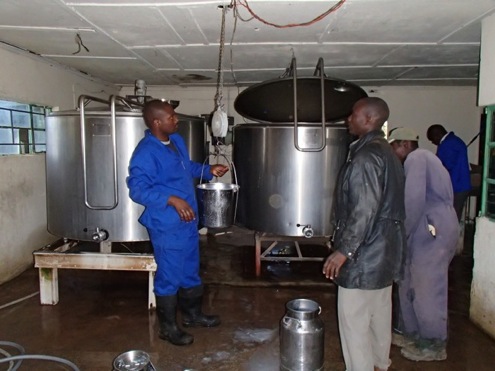
Without bicycles, farmers had a very tough time getting the milk to the cooling facility before the milk started going sour. Milk needs to be from cow to dairy within an hour, which is tough to do on foot. And besides, a walk of 4-5 Km while carrying a 45lb urn of milk is no easy thing.
Here’s a little video of me talking with F.K. Day, president of WBR, after visiting this facility:
We then went to visit with one of the families who started with a bike, a cow, and a farm, and has — thanks to being able to move more milk with bikes they’ve financed with WBR — now has seven milking cows, two oxen, and three calves.
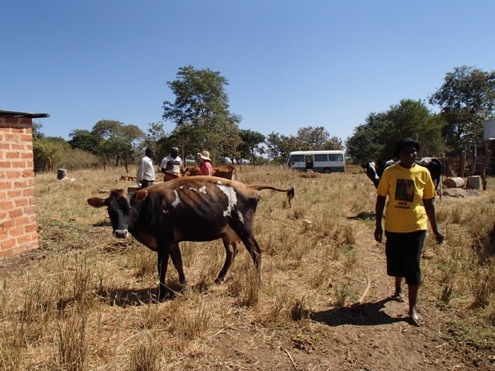
The woman in the photo is Clementina, the matriarch in this house. My photo’s not great, so you can’t tell she is wearing a nice shirt and a sparkly hat. She was so embarrassed that she hadn’t swept the outhouse before we came. “There’s a bathroom in the house,” she said, “But it’s off the master bedroom.”
Yes, their house had both plumbing and electricity.
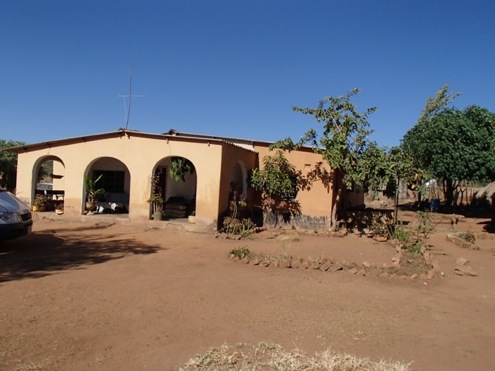
This was by far the wealthiest family we had met in rural Zambia, and while the family’s hard work was the most crucial aspect of this, all the drive in the world wouldn’t have made a difference without the power of good WBR bicycles.
Now, keep in mind that this house holds 2+ families — so while this is a huge improvement, prosperity is still relative. They aren’t so rich yet that they can afford to buy bikes outright — they still have to buy their new bikes (which cost about $150) on loan.
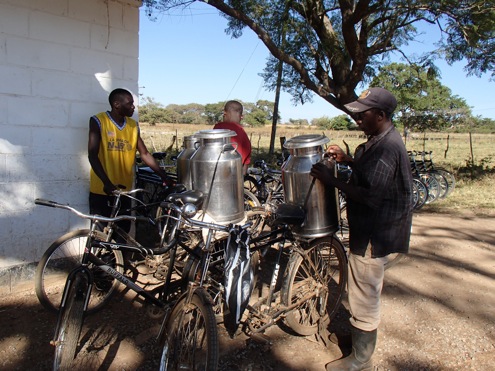
Still, the farm is growing, and supports the family, their children, and even a grandchild — a three-year-old boy who was already pretty good at herding a calf back into its corral:
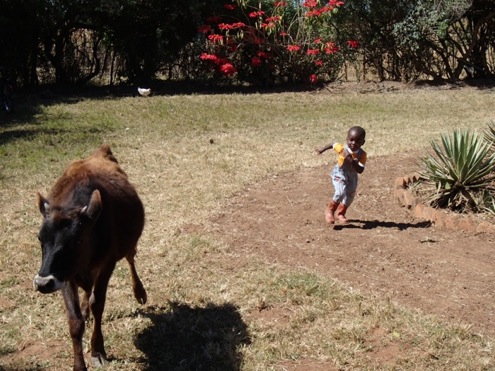
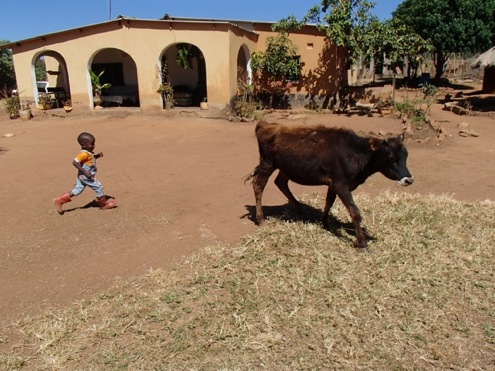
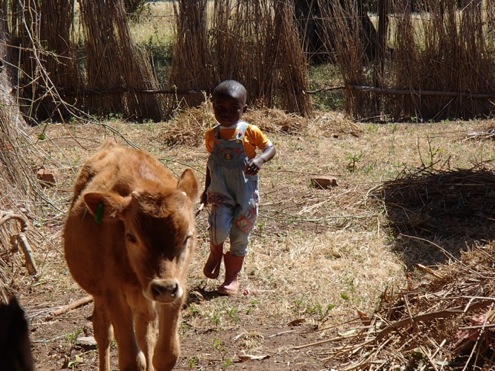
Each time we met with a family in Zambia, it started and ended by gathering under a tree. The meeting with this family was different, though. With other families, they were mostly just so overwhelmed with happiness at ever having received anything that all they could do was thank us.
With the dairy farmers, though, they started with thanking us, but then quickly went on to suggest improvements and lodge complaints about the bikes they had. This was actually really cool, for a couple of reasons. First, because it showed that since they had bought the bikes, they were empowered — they didn’t just have to unquestioningly accept anything that came their way anymore.
The second thing was, now they had some bikes, they wanted better and stronger bikes, and were even talking about taking the next step — getting a motorcycle. It was really cool to see how a taste of success leads to an appetite for more success.
And it was really great seeing how a family had gone from literally nothing (their first cow was a grant from a Land-O-Lakes program) to being successful dairy farmers with plans to continue growing their business.
The Travelling Mechanic
Of course, all those bikes need to be serviced and repaired from time to time. WBR takes that problem and turns it into an opportunity: for every 50 bikes that are put into the field, they train a person to be a field mechanic. Suddenly, in addition to more people being able to get around better, you also have another person with a new, valuable skill.
We got a chance to meet one of these field mechanics, Grayford. He makes a living as a traveling bike mechanic, bringing his tools and skills with him to fix bikes whereever he’s needed.
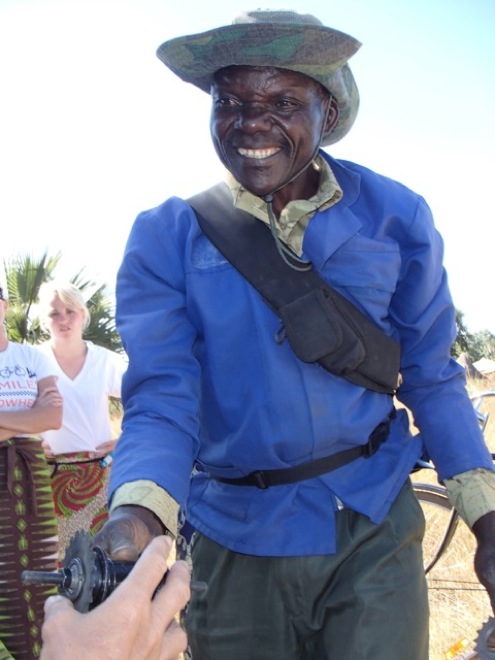
Grayford showed us his certificate that he’s a trained mechanic — he carries this with him everywhere he goes, to show his credibility:
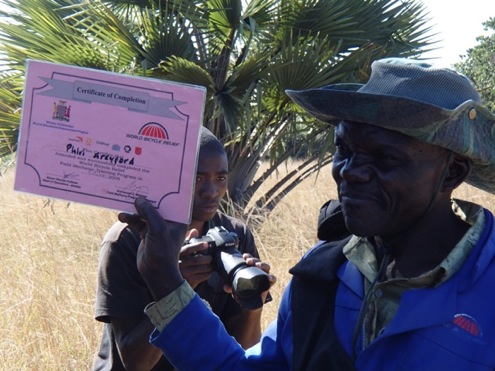
Grayford’s a smart businessman. He advertises his business by painting his mobile number on his bike:
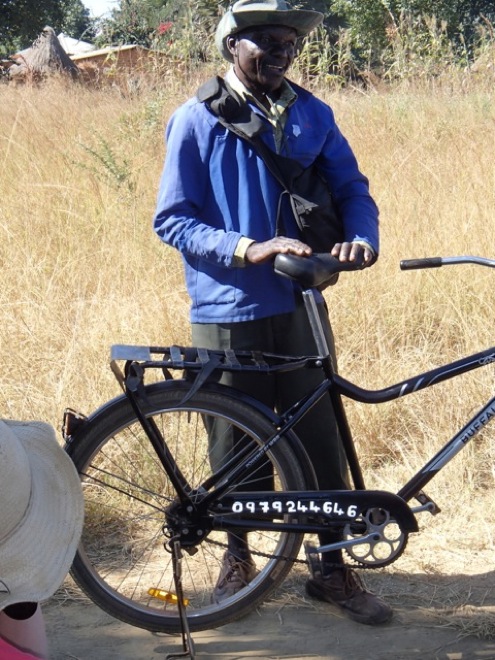
That was the one piece of technology that seemed to be everywhere: cel phones. For example, the man who was having his bike fixed had no shoes, but he did have a cel phone.
Grayford takes Kwacha (paper money) for payment, as well as chickens, eggs, goats, or whatever he can negotiate.
After watching Grayford fix the man’s bike, we went to see Albert, who had opened a bike shop, specializing in selling and servicing Buffalo Bikes (the kind of bikes that World Bicycle Relief makes and distributes) in an open marketplace.
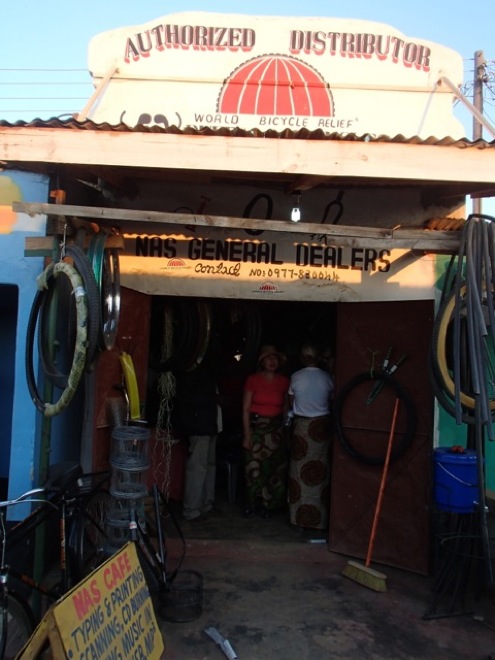
It’s a huge marketplace, with most people bringing their goods to sell via bicycle, as well as by walking and carrying things on their heads:
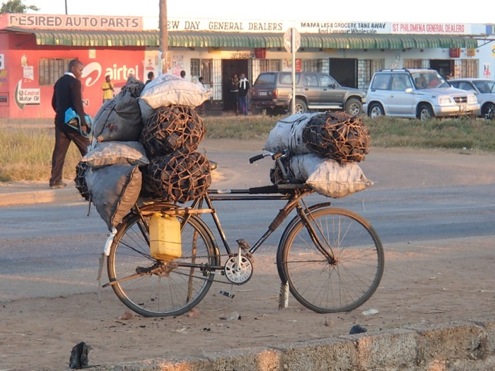
Pretty loaded up, huh?
Albert was doing so well with his bike shop that he was expanding his business, opening a butcher’s shop in the same market. He also bought — at a discount, because we’d been riding them all week — the bikes we had built and ridden to the market. He already had buyers waiting for each of these bikes.
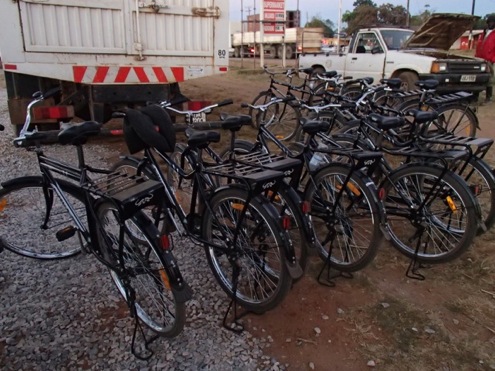
There’s huge demand for Buffalo Bikes, because they’re a lot better built than the cheap bikes that most people have to get in Zambia. WBR has put a ton of work into developing and refining their bike design to make a strong, durable bike that can withstand the demands people put on them in Africa.
It was an amazing day, seeing the way WBR is helping not just students and caregivers, but giving people with drive and ideas the tools to succeed. Priming the pump, and then getting out of the way.
All with what I am more convinced than ever is the most amazing machine that has ever been invented: the bicycle.
Having seen what WBR does and how it’s doing it, I’m a believer. I’m not just running this fundraiser; I’ve donated enough to buy half a dozen bicycles myself (I bought three, which will automatically be matched by the anonymous donors who are matching every dollar in this fundraiser.
I hope you’ll find the money to make a donation too, hopefully by Christmas Eve, which is when this fundraiser ends. You may win something awesome, and you’ll definitely change a life for the better. Which is a pretty amazing thing to be able to do.
Click here to donate. And thanks.
Comments (16)
12.18.2012 | 3:10 pm
A Note from Fatty: Today at 1pm ET / 10am PT, I’ll be hosting a live interview / Q&A with James Huang, the CyclingNews and Bike Radar technical editor / god of bicycle knowledge. You can watch the interview below, though I suggest clicking here to Spreecast, where you can join in the chat and ask James questions yourself.
I’ve been a fan of James for — well, I don’t know how long. Years and years.
But I do know why I’m a fan of James. It’s because I’ve found I can trust him. He writes the fairest, most honest, and comprehensive bike gear reviews I’ve ever seen. His knowledge of bike gear runs as deep as mine runs shallow, and yet he writes clearly and cleanly, so even a dope like me can understand what he’s saying.
So I’ve invited him over for a chat, to talk about what it’s like to be privy to what’s coming next in the bike industry, to be paid to see and ride stuff daily that the rest of us can only dream of.
And to find out how and why he chose his Twitter moniker, @angryasian.
Best of all, James has agreed to answer questions. So if you’ve been wondering about getting a new bike or upgrading the one you have or are wondering about some other gear-related thing, this will be your chance to ask one of the very most informed guys in the business.
Join me today at 1pm ET / 12noon CT / 11am MT / 10am PT, either right here, or over at SpreeCast.
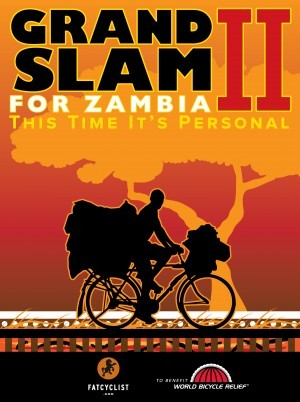
More Awesome Prizes In Grand Slam 2
Guess what? We’re down to less than a week in the Grand Slam 2 for Zambia: This Time It’s Personal. We’ve raised more than $111,111. Which means we’ve got just under $14,000 to raise in just under a week.
Now, just to refresh your memory, there are already a ridiculous number of prizes that will be awarded once this contest ends, including:
- A Specialized S-Works Roubaix, with the Zipp wheelset of your choice and SRAM Red components
- A Specialized S-Works Stumpjumper FSR Carbon 29, with SRAM XX components, Rise 60 wheels, and Truvativ T40 bar and stem
- A deluxe trip to train with Patrick Dempsey and Tom Danielson at The Ranch resort in Malibu, California
- An All-Events, VIP Entry to Levi’s GranFondo, along with Levi’s 2012 Tour de France jersey and numbers
- A VIP Entry into the inaugural, by-invitation-only Rebecca’s Private Idaho, including flight, hotel, and entry into this exclusive event
- A Miir Wave or High 5 commuter bicycle
- 6 gift Certificates for $134 each from Twin Six, makers of beautiful biking clothing
- 3 Trips to Moab for the “Africa in Moab” experience
That is, I believe you will agree, a lot of amazing prizes. I believe you will further agree that the cause is as worthy as there could be: you are making it possible to give someone the chance to thrive, instead of just survive. You are giving them a way to stay in school, to get a better job. You’re giving them the chance to see what they can do if they have the power of a bicycle.
And you do all that good — and have a shot at all these prizes — by donating at my Grand Slam 2 page. Even $5 gets you a shot at all the prizes, with your chances improving as you donate more.
Just in case you come from some bizarre universe where I haven’t given you enough incentive to make a donation, though, today I’m going to reveal three more fantastic prizes.
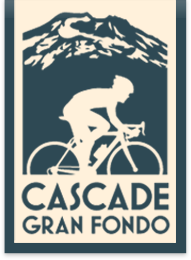
Two Tickets to All Events at Chris Horner’s Cascade Gran Fondo
I’m going to be honest here: I’ve never been to Chris Horner’s Cascade Gran Fondo. However, I have been to Bend, Oregon (for the Leadman Tri 250), and can promise you this: Bend is beautiful, and the riding there is top-notch.
So I have a feeling that the Cascade Gran Fondo is going to kick butt. How could it not?
And the cool thing is, the winner of this prize will get to bring someone along, and you’ll get to go to not just the Gran Fondo ride and expo, but to all three events, including the VIP dinner and the evening of stories.
Hey, if you win this one, promise me you’ll take lots of pictures and write up the event for this blog, K?

Honey Stinger Smorgasbord
I don’t really need to tell you about how much I love Honey Stinger products, do I? I mean, I love pretty much every single thing they make. Their waffles. Their gels. Their energy chews. Everything. So I’m feeling no small amount of envy for the person who wins this prize. You’re going to be pretty much set for the season with this amount of Honey Stinger goodness:
- 1 box of each flavor Organic Stinger Waffle: Chocolate, Honey, Lemon, Vanilla, and Strawberry. That’s five boxes!
- 1 box of each flavor Organic Energy Gel: Honey Stinger Energy Gels are absolutely my endurance food of choice. I relied on them pretty much exclusively this year during the Leadville 100, the Leadman Tri 250, and the Breck Epic. They are — without question — my favorite gels of all time. And you’re going to get three boxes of them: Vanilla, Fruit Smoothie, and (my favorite) Acai & and Pomegranate
- 1 Honey Stinger Cycling Cap
- 1 Honey Stinger Trucker Hat
- 1 Honey Stinger Sticker Pack

Signed Ted King Jersey and Swag Bag
You are — alas — not pro cyclist Ted King. And I am not either (alas).
However, you can console yourself by winning a signed jersey from Ted King, along with a very cool swag bag of “I Am Not Ted King” gear, like this T-shirt and other assorted things, at Ted King’s discretion.
From what I understand, the first step in accepting that you are not Ted King is wearing a t-shirt that states as much.
So. Add these three cool new prizes to the 13 listed above, plus the two we’ve already given away, and that’s 18 prizes in this contest.
And the thing is, I’m still not done announcing all the prizes in the Grand Slam 2. Seriously, I’m not.
My point being, the number and awesomeness of the prizes, combined with the outstanding cause, combined with the fact that every dollar you donate during this fundraiser gets automatically matched, I’m going to assert that this is in fact the perfect storm of fundraisers.
So. Go donate. Please. And thanks.
Comments (14)
12.17.2012 | 1:18 pm
There was just no way I could write something funny today. No way I could write about a ride. No way I could even talk about the Grand Slam 2 Fundraiser. Because like everyone I know, I’m too messed up — horrified, stunned, sad, angry, scared, dismayed, you name it — over the killings in Connecticut to think meaningfully about anything else.
So I’m going to write a little bit about this. And see if I can, by trying to order the jumble in my mind into sentences, make some sense.
Sick to My Stomach
I was driving to a company Christmas lunch and white elephant exchange when I found out about about what had happened. I called Lisa — who was out doing some Christmas shopping — and told her what I had heard.
Then we just took turns saying variations of “I can’t believe this,” and “Why would anyone do something so unspeakable?” The fact was — and is — there was simply no way we could understand or grasp something so unimaginably evil.
The rest of the day, this horrible thing kept coming to mind. I’d push it out — unable to understand, unable to help, physically ill at the realization there could be someone so perfectly vile as to kill. Over and over. Or — even worse, though I would never have imagined this to be possible — to kill children. People who were just starting to become their individual selves. Just starting to reveal who they were to their parents.
I kept thinking how much like my own children’s school this thing happened at. Then — like millions and millions of parents, I suspect — I felt a little wave of panic and wished my twins would get home soon.
What I Know and What I Don’t
The whole weekend I kept thinking about what this killing. I thought about the kids. The guns. The parents. The families. The killer. The loss. I knew that it was on my mind too much to not write about it when Monday arrived, but what do I have to say that’s worth saying?
I know enough about how people feel about guns and gun laws and the second amendment that I know I don’t want to talk about that. Yes, I know it needs talking about, but I’ll leave that to others; it’s too complex a topic — and too politically loaded — for someone like me to approach.
I know enough about mental illness to know this isn’t something I can really talk about with any authority either.
But I do know a little bit about loss. I’ve been through tragic loss — of a much different kind, but still: a tragic loss. And I have the sense that most people, at some point, at least get frighteningly close to someone who’s been through a terrible, incomprehensible loss.
Here are a few things I remember. Maybe some of them will help. Maybe some of them won’t. I’m just one person, and what helped me might not be much help at all to another.
I don’t presume that this will help anyone remotely involved in the Connecticut tragedy. But maybe it will be useful to you as you deal with others’ loss, or maybe loss of your own.
Or maybe it won’t help at all. I don’t know.
Coming Over
The night Susan died, one of my friends called, asking if I’d like him to come over. I said “no,” and I meant it honestly. I didn’t want to be with anyone. Didn’t want anyone to see me. Didn’t have the energy to see anyone.
Another one of my friends just came over. He didn’t ask. As it turns out, having a friend there amidst all the family was good. I don’t remember what we talked about or whether we talked at all, but it was really good to have him there.
So which is the right way? Both, I think. If you’re the kind of person who calls and asks, do. If you’re the kind of person who can just show up, do. Both are signs of solidarity.
Helping
Everyone’s impulse is to ask how they can help. I will tell you that I hated that question. It required me to do so much thinking and deciding. What do I need help with? Am I willing to admit that I need help with this? Is this a person who I trust to handle something I need done if I ask for that help, or will I just be exchanging the work of doing something for the work of managing the doing of that thing?
Does this person really want to help, or is this just an offer of condolence?
On the other hand, when a friend of mine — who manages a lawn care company — said, “I’m going to take care of your lawn for the rest of the summer, OK?” I was incredibly grateful.
I think there’s a lesson there. If you have an offer of help to make, try to make it concrete — what you’re going to do (in particular if it’s something you have expertise in). And make the offer as a statement, rather than as a question (“Do you need help with anything?”)
Also, remember that offers of help tend to come in a giant flood at first, and slow to a trickle within a week or a month or whatever. As your loved on goes from being overwhelmed with offers to simply being overwhelmed, a renewed offer of help a few weeks or months down the road might be more helpful than one right away.
Religion
This is one topic I almost decided to leave out, because it’s as potentially inflammatory as the guns and politics part of this discussion I’m trying to steer clear of.
Which is maybe ironic, because steering clear of religion is actually the piece of advice I have to give.
You may have good reason to ignore this piece of advice — if you’re strongly religious and you are absolutely certain that the person you’re comforting is also strongly religious, for one example. Or if the person you’re comforting has initiated talk of faith.
However, unless your confidence on the person’s feelings toward religion are absolute, you might want to steer clear. Your world view may not be their world view, and this isn’t the time to put them in the awkward position of deciding whether to smile and listen to something they find offensive.
Or — supposing the person you’re talking to is ostensibly even of the same religion as you — you don’t know whether the person might currently be feeling some serious anger or at least ambivalence toward your deity at the moment. Is this really a good moment to ask for a show of faith?
This may be a good time to — instead of assuring this person of the power of prayer and letting them know that you personally have plenty of faith — pray on their behalf and let it work its power without you telling them about it.
On the Bright Side
Maybe some people really do get cheered up when others try to find a silver lining to a tragedy. For myself, only my inability to yell at well-meaning people kept me from shouting, “Don’t try to tell me that this death came with perks.”
Eventually, many people — including me, I hope — can take something horrible and use it for a catalyst for good. But don’t presume that anything good comes bundled, no charge, with any tragedy.
Telling Your Own Stories
For me, it was helpful to hear people who had actually been through the same thing tell me “You’ll get through it; you’ll be OK.”
It was not helpful, on the other hand, when people simply knew of a similar tragedy, and thought they were showing solidarity or understanding by recounting it. I was already so distraught and angry and worried about the future that every time someone told me their story, I’d just hear that they knew someone who had endured something worse than I had, and had handled it better than I was.
Saying “I’m Sorry”
What makes a tragedy a tragedy — and not just a problem — is that it can’t just be fixed. There’s not much you can say that will make it better. And saying “I’m sorry” just doesn’t seem like it’s enough.
But you know what? I appreciated every single person who just said that. An acknowledgment that something terrible has happened along with an expression of sympathy.
It’s not much, which is part of the nature of tragedy and loss. No matter how badly you want to do enough, you just can’t do much to help.
But it’s something. And sometimes that has to be enough.
PS: My sister Jodi has a good piece today on what she’s thinking and doing after this attack. Read it here.
Comments (47)
« Previous Entries Next Page »
 A month and a half ago, I set an ambitious goal: raise $125,000 for World Bicycle Relief (WBR) by December 24. That money, thanks to a dollar-for-dollar matching commitment secured by WBR, would then be doubled to a quarter-million dollars.
A month and a half ago, I set an ambitious goal: raise $125,000 for World Bicycle Relief (WBR) by December 24. That money, thanks to a dollar-for-dollar matching commitment secured by WBR, would then be doubled to a quarter-million dollars. 

 A Note from Fatty: We’re very nearly at the end. No, not of the world, silly. We’re nearly at the end of the
A Note from Fatty: We’re very nearly at the end. No, not of the world, silly. We’re nearly at the end of the 















